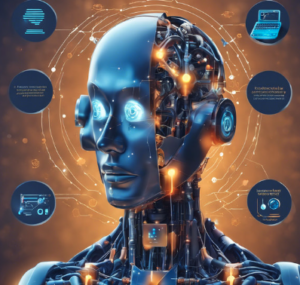
Introduction to Machine Learning
Machine learning (ML) is a field of artificial intelligence (AI) that enables machines to learn from data and make decisions or predictions without explicit programming. In traditional software development, a programmer writes a set of rules and instructions that guide the software on how to complete tasks. However, in machine learning, computers are trained to recognize patterns in data and use these patterns to predict future outcomes.
The essence of machine learning lies in the concept of data-driven decision-making. Unlike classical programming, where every scenario must be anticipated and coded in advance, ML systems are designed to adapt and improve their performance over time. This dynamic ability to learn from past experiences and make informed decisions has wide-ranging applications across industries.
Today, machine learning powers many aspects of our lives, from personalized recommendations on streaming platforms like Netflix and YouTube to detecting fraudulent activities in banking systems. The field is rapidly evolving, with advancements being made every day. This article explores what machine learning is, how it works, its applications, and, importantly, how you can begin your own journey into this exciting and transformative field.
How Machine Learning Works
Machine learning algorithms work by identifying patterns in data and making predictions based on those patterns. The process of machine learning typically follows a series of stages: data collection, data preprocessing, model training, evaluation, and deployment. Each of these stages is crucial in developing an effective machine learning model.
1. Data Collection
The first step in machine learning is gathering relevant data. Data can come from various sources, such as sensors, databases, websites, or surveys. For example, if you’re building a recommendation system for an e-commerce platform, the data might include user purchase histories, search queries, ratings, and product details. The quality and quantity of the data will significantly influence the accuracy and efficiency of the machine learning model.
2. Data Preprocessing
Once the data is collected, it needs to be cleaned and prepared for the next stages. This process is called data preprocessing. In this step, irrelevant, incomplete, or noisy data is removed, and any missing values are handled. Data preprocessing can also include normalization, which ensures that numerical data is on a similar scale, and feature extraction, which selects the most important features (variables) in the dataset. Proper preprocessing is essential because the quality of your data directly affects the performance of your model.
3. Model Selection
After preprocessing, the next step is choosing a machine learning model. This decision depends on the nature of the problem you want to solve. If your goal is to predict a category, such as whether an email is spam, you would likely use a classification model. If you’re predicting continuous values, such as house prices, you would use regression techniques. Popular algorithms for classification include logistic regression, decision trees, and support vector machines (SVMs), while linear regression and decision trees are commonly used for regression tasks.
4. Model Training
Training is where the machine learning magic happens. During training, the model learns from the data by adjusting its internal parameters to minimize errors. For supervised learning, the model is provided with labeled data (inputs with known outputs), and it uses this data to make predictions and update its parameters. In unsupervised learning, the model works with unlabeled data and attempts to discover underlying patterns, such as grouping similar data points together.
5. Model Evaluation
After training, it’s time to evaluate how well the model performs on new, unseen data. This evaluation is critical because a model might perform well on the training data but fail to generalize to new data. Common evaluation metrics include accuracy, precision, recall, and F1 score for classification tasks, and mean squared error (MSE) or R-squared for regression. If the model’s performance isn’t satisfactory, adjustments can be made, such as tuning hyperparameters or changing the algorithm.
6. Model Deployment
Once the model has been trained and evaluated successfully, it can be deployed for real-world use. This means integrating the model into a system or application where it can make predictions on new, incoming data. In some cases, the model might be deployed on a cloud server or within an application, where it can continue to improve over time as it processes more data.
Types of Machine Learning
Machine learning can be divided into three primary categories: supervised learning, unsupervised learning, and reinforcement learning. Each category is suited to different types of problems and data.
1. Supervised Learning
Supervised learning is the most common type of machine learning. In this method, the algorithm is trained on a labeled dataset, meaning the input data is paired with the correct output. The goal of supervised learning is to find a mapping from inputs to outputs so the model can make predictions on new, unseen data.
Supervised learning problems are divided into two main types:
- Classification: The output variable is categorical, meaning the model predicts a label or class. Examples include spam email detection (spam or not spam) or image classification (cat, dog, or bird).
- Regression: The output variable is continuous, meaning the model predicts a numerical value. Examples include predicting house prices based on features such as square footage, location, and number of bedrooms, or forecasting stock prices.
2. Unsupervised Learning
In unsupervised learning, the algorithm is given data without labeled outputs. The goal of unsupervised learning is to discover hidden patterns, structures, or relationships within the data. This type of learning is often used for tasks like clustering or dimensionality reduction.
Common unsupervised learning techniques include:
- Clustering: Grouping data points into clusters based on similarity. K-means clustering is a popular clustering algorithm.
- Dimensionality Reduction: Reducing the number of features in a dataset while retaining the most important information. Principal Component Analysis (PCA) is commonly used for this task.
3. Reinforcement Learning
Reinforcement learning (RL) is a type of machine learning in which an agent learns by interacting with an environment. The agent receives feedback in the form of rewards or penalties based on the actions it takes. The goal is for the agent to maximize its long-term cumulative reward by learning the best strategies through trial and error.
Reinforcement learning has been applied in various fields, including robotics (for path planning and decision-making), gaming (as seen with AlphaGo), and autonomous vehicles (for navigation and decision-making).
Applications of Machine Learning in 2024
Machine learning is becoming increasingly integrated into everyday applications. The following sections highlight some of the most significant areas where machine learning is making a notable impact.
1. Healthcare
Machine learning is revolutionizing healthcare by improving diagnostic accuracy, treatment personalization, and patient monitoring. Algorithms can analyze medical images (like X-rays, CT scans, and MRIs) to detect conditions such as cancer, fractures, or heart disease. ML models can also predict patient outcomes, optimize treatment plans, and even identify potential drug candidates. For example, IBM Watson Health has been leveraging machine learning to help doctors make better treatment decisions.
2. Finance
Machine learning is widely used in the financial industry for fraud detection, algorithmic trading, risk assessment, and customer service. Fraud detection systems use ML to identify unusual patterns in financial transactions, helping banks and credit card companies spot potential fraud. Additionally, ML algorithms are used for predicting stock prices, developing trading strategies, and optimizing investment portfolios.
3. Transportation
The transportation industry has embraced machine learning to enhance safety and efficiency. Self-driving cars, for example, use machine learning to process data from cameras, sensors, and LIDAR systems to navigate the environment, avoid obstacles, and make decisions in real-time. In addition, ML is used in logistics to optimize delivery routes, reduce fuel consumption, and predict maintenance needs for vehicles.
4. Retail
Retailers use machine learning to enhance customer experience, predict demand, and optimize inventory management. Recommendation systems, like those used by Amazon and Netflix, use machine learning to suggest products or content based on past behavior and preferences. ML models are also employed to predict sales trends, set dynamic pricing, and improve supply chain management.
5. Entertainment
Machine learning is reshaping the entertainment industry by enabling personalized content recommendations. Streaming platforms like Spotify and Netflix use ML to analyze user preferences and suggest movies, shows, and music tailored to individual tastes. ML is also used in content creation, such as enhancing video quality, creating realistic animations, and even generating music.
Popular Machine Learning Algorithms
Several machine learning algorithms are widely used across different types of problems. Below are some of the most popular algorithms:
1. Linear Regression
Linear regression is a simple and widely used algorithm for predicting a continuous target variable based on one or more input features. It assumes a linear relationship between input variables and the target variable. It is commonly used for tasks like predicting house prices, sales forecasting, and trend analysis.
2. Decision Trees
A decision tree is a supervised learning algorithm used for both classification and regression tasks. It splits the data into subsets based on the values of input features, resulting in a tree-like structure. Each node in the tree represents a decision rule, and the leaves represent the predicted output.
3. Random Forest
Random forest is an ensemble learning method that creates multiple decision trees and combines their predictions to improve performance. Random forests are highly accurate and robust, making them suitable for classification and regression tasks.
4. Support Vector Machines (SVM)
Support vector machines are a type of supervised learning algorithm used for classification tasks. They work by finding the optimal hyperplane that separates different classes of data. SVMs are particularly effective in high-dimensional spaces and for problems with a clear margin of separation.
5. K-Means Clustering
K-means clustering is an unsupervised learning algorithm used for grouping similar data points into clusters. The algorithm works by iteratively assigning data points to the nearest cluster center, adjusting the centers based on the mean of the points in each cluster.
How to Get Started with Machine Learning
If you’re eager to dive into machine learning in 2024, here are some steps to help you get started:
1. Learn the Basics of Programming
Before jumping into machine learning, you should have a basic understanding of programming. Python is the most popular language for machine learning due to its simplicity and extensive libraries. Begin with Python and focus on understanding key concepts like data structures, loops, and functions.
2. Learn Mathematics and Statistics
Mathematics and statistics form the foundation of many machine learning algorithms. Brush up on linear algebra (for matrix operations), calculus (for optimization), and probability (for understanding uncertainty in models). A solid grasp of these concepts will help you understand how machine learning models work under the hood.
3. Take Online Courses
There are several online courses and tutorials that cater to beginners. Websites like Coursera, edX, and Udemy offer high-quality courses on machine learning that provide a hands-on introduction. The courses often include practical projects to help you apply what you learn.
4. Work on Projects
Hands-on experience is the best way to solidify your knowledge. Start by working on simple machine learning projects, such as building a spam email classifier or predicting housing prices. As you become more comfortable, you can tackle more complex projects like image recognition or sentiment analysis.
5. Join Online Communities
Machine learning is a constantly evolving field, and staying updated is essential. Join online communities, such as Reddit’s machine learning subreddit or LinkedIn groups, to stay connected with other learners and professionals. These communities are great places to ask questions, share your projects, and learn from others.
Machine learning is a fascinating and rapidly advancing field with applications across industries. While it may seem complex at first, with the right approach, anyone can learn the fundamentals and start building their own models. Whether you want to pursue a career in AI or simply gain a better understanding of how intelligent systems work, the steps outlined in this guide will help you begin your machine learning journey in 2024.
By understanding the basics of machine learning, experimenting with different algorithms, and gaining hands-on experience, you’ll be well on your way to becoming a skilled practitioner.
Feel free to check out our other website at : https://synergypublish.com



